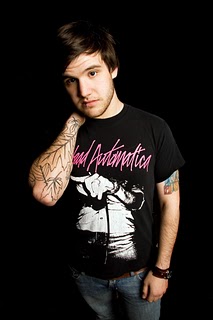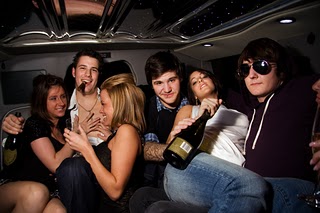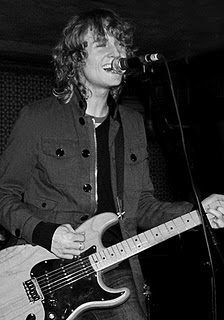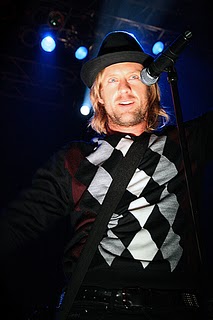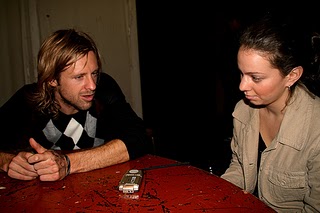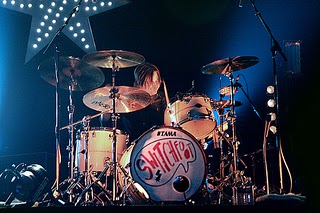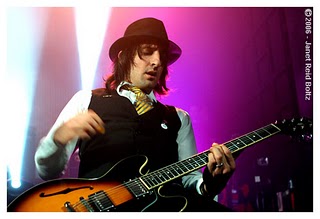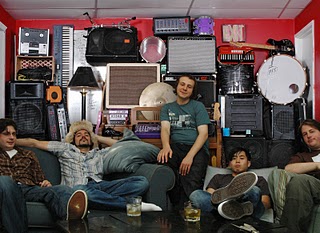 With a recent invitation to play the South by Southwest festival in Texas as well as songs being considered for hit TV shows, Heroes and Grey’s Anatomy, 2008 looks like it will be a good year for Happy Anarchy. The five-piece band just released their debut album, Reset, in November and have hopes to tour the rest of the year. I sat down with the guys Saturday night before their performance at The Bowery Poetry Club, where they talked to me about the band, how they describe their music and their hopes for the future. I’ll list their full names/instruments they play below so you get a better idea of who’s talking.
With a recent invitation to play the South by Southwest festival in Texas as well as songs being considered for hit TV shows, Heroes and Grey’s Anatomy, 2008 looks like it will be a good year for Happy Anarchy. The five-piece band just released their debut album, Reset, in November and have hopes to tour the rest of the year. I sat down with the guys Saturday night before their performance at The Bowery Poetry Club, where they talked to me about the band, how they describe their music and their hopes for the future. I’ll list their full names/instruments they play below so you get a better idea of who’s talking.
Joe Pecora-vocals/guitar
Tim Boylan-acoustic guitar/trombone
Yuhei Yamanaka-electric guitar
Pete Smith-drums
Jesse Blum-keyboards/trumpet
Tell me a little bit about Happy Anarchy. How did you guys come together
Joe: Basically, the band as it is right now is about a year old. We had another band before that with a bunch of different people. Me and Tim are the only original ones we had. We kind of tried to keep it together with new members but it just fell apart. It just ended up being me, Tim and Yuhei for a long period of time. Then Pete and Jesse joined and the band was more focused and it became a little more real for us. So it’s about a year or so.
Tim: We went basically from the early days, being the college band, the band with the silly hats that you go to see at the bar- they play cover songs and they’re a little goofy. From there we’ve evolved into a rather serious rock band. I don’t know how serious we are individually, but as far as the music goes that’s what we want to do. The sound has definitely matured. If I were to go back and listen to the old albums, which I don’t do ever, but if I were to do that I would say, “Wow this doesn’t sound like us at all because it’s so immature.” Which is not a bad thing; it’s just where we were. We were all young, just started playing in a band so naturally that’s how it’s going to come out. And as you play and as you grow, over 10 years you get to where we’re at now. Which maybe could have happened a little bit quicker, but who’s really going to complain about timelines. I can’t. I’m not going to do it.
Yuhei: The funny thing is the band, in many forms, really has been around for a long time. What I consider Happy Anarchy now is ever since Pete and Jesse joined, that’s what the band is now. There was a year period where it was just the three of us, Joe, me and Tim and we were just struggling to sing the songs. Ever since they joined, they added so much. That’s what the evolution is. How their input has helped shape the fabric that Happy Anarchy is now and helped shape the album. The album has everybody’s input in it. Coming from eight band members to three and now back up to five, the members we have now have helped shape the sound.
Why did you decide to join Happy Anarchy?
Jesse: Peter was playing in the band. We had been friends for a long time; we used to play in another band together. He told me they needed a trumpet player and a keyboard player and I play both. I listened to their music and enjoyed it. At the time I wasn’t playing rock music, which was very sad for me. I kept saying to my girlfriend, “I gotta play rock music!” And so this happened. I think one of the great things about the band was that I’d show up, after missing a few rehearsals, and they would always sound better as a band then they had the previous time. They want to sound good and we all have the same definition of the word excellence, which can be a problem when you’re working with people. I think it’s just a great, rockin’, good old-fashioned American rock band. That’s what I always like to say. We sound like America rock. I don’t know. I feel like it’s a nice swishing together of all different styles of music. (Joe laughs.)
Jesse: You don’t think that’s true?
Joe: Yes. Sure. I like it.
Pete: I really look forward to going to rehearsals and going to shows. I like them all as people, I respect them all as musicians and I really think its great music and it’s one of the best gigs I’ve had in forever. I came kind of late in the game, but I was given credit which I really appreciate. Obviously they had something going on already. We’re having a good time. To me, it’s a meal ticket. When I heard that this was open I jumped at it and insisted that they call me back and it’s worked out pretty well since then.
Do you write all the lyrics and music yourself?
Joe: It’s kind of a mixture of things. A lot of times I’ll come up with a chord structure or melody line and then it gets to the band and we’ll change it just by what everybody plays. It really starts from a seed but then it turns into a whole band song by the time it’s done. Sometimes Yuhei will start with something and I’ll add to it. It’s really a group effort.
I really like the quote on your website about your music, “Indie without being Scene, and Rock without the hair.” How would you explain your music to someone who has never heard it before?
Yuhei: That’s one trouble we always have. People like to categorize us with something they’re familiar with. We don’t have a niche. We’re not like a hipster or indie rock band or emo band. I don’t know how to describe it. How Jesse describes it, obviously its classic American rock music. It has a little bit of everything. We take influence from the Chili Peppers to Radiohead to older bands like The Who. I think the cool part is just whatever anyone thinks it is. I’ve learned to like the fact that you can’t be like, “Yeah, they’re like this.” There’s potential for a lot of people to like our band.
Tim: We sound like a lot of things because we come from a lot of things. I always feel like you’re better off asking someone who’s not in the band what the band sounds like. No matter what I say, it’s like, he’s in the band. The other good thing about it is I’ll hear what some people say and think, we don’t sound like that. Where do you hear this in our music? I like to compare us to bands like The Flaming Lips or Super Furry Animals or bands that I really like that don’t all sound the same, their songs are different. You know they are from that band, they have that individual sound to the voice of it but their songs don’t all sound the same. So I just like saying that we’re a rock band. I know it’s broad and it’s hard to figure out what we sound like from that. But I think that’s a good thing because maybe it peaks the curiosity a little bit. Maybe you want to say, “Let me hear what this band sounds like, make my own judgments.”
You guys use the trombone and trumpet in your music too.
Yuehi: Yeah. It’s not every song. When we write songs it’s not like, “Okay, we’re writing whatever type of song.” Joe has an idea, we work around it. Maybe we need a trombone, maybe we don’t. Maybe we need something else. We kind of throw in whatever that we need to make the song work.
I read that you’re in talks for having your music featured on Heroes and Grey’s Anatomy. How do you go about that?
Joe: We let management do it. There’s this company in California that we work with. They work the same way that agents work for actors. They’ll get a break down of shows that need music and the company we use submits our stuff. The past couple of times we’ve gotten past the first or second round. So there’s a possibility the music will be used.
Is that similar with the way you guys got picked to be featured in the South by Southwest festival?
Joe: In the South by Southwest case, they have a showcase of bands there. And we’re one of their bands. They have about 200 to 300 bands there. They have our CD and talked with our management.
Jesse: I like to think that the music is the most important part. You try to make a good product and hope that people hear it and respond positively.
Are you excited about South by Southwest?
Joe: Yeah. We’re writing a lot of songs right now. It feels like that will be the place to do it. Austin is a big city, like a music mecca for blocks. It’s filled up day and night with music. Flaming Lips plays every once in a while. I think R.E.M. is playing this year. It’s kind of like a Sundance for music. I’m really glad we actually get a chance to be a part of it. For a small band like us, it makes us feel like we’re a part of something. The best thing that could happen for us is that we can find some other bands and develop friendships, book future tours.
Tim: I wasn’t really holding out hopes that we would get it. By this point, if I get excited about something it generally doesn’t pan out. This came through and I’m really happy that we’re gonna get the chance to go down there and play. I don’t really know what will come out of it. But, it will be great if something comes up. I just really want to get out on the road and play. We’re not trying to be rock stars.
Do you have a favorite song on the record?
Tim: “In Reverse” is my favorite song on the record. I think because it’s the best song, the most songful song we have on the album. (laughs) I love the way it rocks, the way it moves. I think it has one of the best melody lines written. A lot in that song that you can latch onto and it’s not immediately apparent. Some of the other songs are right there for you, but with “In Reverse” you have to sift through the layers that are there and there are hooks all over the place.
Yuhei: I like “In Reverse.” It’s my favorite one I think. There’s a couple, it’s hard to pick, but that one sticks out for me. It’s one of those songs where I had more in the writing process. It started when I introduced a riff to Joe and as we were working on it, it became something completely different. It starts with a drum loop, that was when we didn’t have a drummer yet, but we left that loop in there. It started with the three of us and the parts that finished it were obviously Pete and Jesse. There are live jumps in there afterwards and keyboards come in. It starts from the band where it’s just the three of us, but then it finishes with all of us. So, I guess that’s why it’s my favorite song.
Joe: I like “On and On,” it’s the last track on the album. It feels like the future. I think the song ties the lyrics and the song together. It’s where we’re going to go next.
Jesse: I can’t tell you my favorite song, it’s just hard to pick one. I would say “Personal Judas,” “Bomp,” and “Is That Right” are favorites of mine. I think they represent the sound of the band I enjoy most. I believe that is what Happy Anarchy will sound like most.
Pete: I think probably “In Reverse” and “At the Bottom of the Sea.” “At the Bottom of the Sea” being the first video that we’re going to do.
Do you know where you’re going to shoot it?
Pete: We just met the director tonight before the show. I hear there is going to be a lot of animation, like CG and stop-action, that kind of thing. I have no idea; I’ve never seen his work. They [management] researched him and his work so I’m pretty sure it’s going to be awesome because they’re picky. I leave that in the hands of capable people.
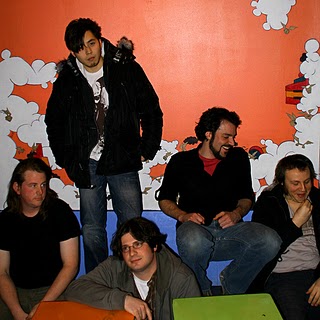
At first, when listening to “Bomp” it’s a pretty upbeat song and then you listen more closely to the lyrics: “Just wait a second, now, cause there’s always hope/Said the man with the necktie of a rope/Watching the clock as he waits for the trap door to swing.” What were you thinking of when you wrote it?
Joe: I have a hard time straightening out my thoughts. After a while I felt like I was getting older and I wasn’t doing anything. It’s that feeling of congestion, being pushed and stuff keeps piling on and it feels like you can’t stop running and how that feeling makes you react. There’s that part in the chorus where you explode at the wrong time and place. It’s modern life. My interpretation of modern life, but it’s better now.
Pete: It’s a man under pressure. Every once in a while that guy just loses his shit, that guy just loses his mind. An alternate name for that was thumscrewed thoughts, but it was a little too obscure. Like, who’s going to remember that? But when its onomatopoeia, when you actually use the sound it sounds like, bomp ba bomp, it’s a little more catchy. But it really is kind of like a thumbscrew thing, when every once in a while the twists get a little tighter. It’s a guy under a tremendous amount of pressure trying not to lose it. Nothing is fantastic here. I think everything is drawn from reality. Music is therapy for all of us. It’s not a business; it’s worth something to us.
Do you ever feel like you have to hold back when writing a song?
Joe: I’m starting to feel like that now. I feel like I don’t want to write any more songs about myself. I think I did enough of that for the past few years. I guess sometimes I forget that your job as a musician or an artist is to reflect life as a whole to other people. I can’t just reflect my own life. I think that’s selfish. I’m not trying to be selfish. I’m trying to figure out ways that affect me and the
n realize that they affect other
people from that angle.
What are your plans for the rest of the year?
Yuhei: We’re planning a week or so, 10-day tour around the South by Southwest [festival]. We’re also looking to shoot a music video for one of our songs. We’re potentially going to be doing a lot of radio promotion on college radio. That’s going to go along with a tour in time, some publicity, trying to get reviews, all that kind of stuff. Now the album’s out so we’re going to try and make a push. As far as the world’s concerned, the album’s not out yet. It’s on iTunes, a lot of electronic outlets, not in stores yet. What we’re going to try to do the rest of the year is just to push for the record, play as much as we can and do as many interviews as possible.
Pete: We have one quick tour coming up in Texas for South by Southwest for 10 days, whatever we can play along the way. I don’t want to say it’s our trial run, but it’s our maiden voyage as far as consecutive gigs without going home. I’d like to do a lot more this year. Finally we have a product to sell; we have a reason to be out there.
Do you guys have day jobs? (Pete answered this question for everyone.)
Pete: Yeah. I design and build custom sound systems. Mostly for live sound. I pretty much do solely live repair right now. I’m in a really good spot right now. I can go in, work as hard as I can and then go on tour for a while.
Jesse is a jazz musician for a living. He’s in about eight or nine bands right now, a bunch of indie bands. Whoever’s paying, he’ll do it. Joe works at Starbucks. Those are his barista friends over there. They have great benefits, they’re good people, they’re supportive. They’ll move shit around so he can go and do a gig. They’re gonna cover him so he can go to Texas. It’s a good organization. Yuhei works at HQ. He’s a bartender there. It’s a club. He reaps the benefits. It’s a very high class place. Up against Larry Flynt’s, in that vain. People who have too much money – they go there. Tim is a bookkeeper. (Asks Tim what exactly it is that he does)
Tim: I do a lot of things, I have one job, but I have seven jobs therein, so I’m a bunch of people. I’m an executive assistant. I work for a guy who owns stuff and I count all of his money and deal with all of it. You can give me upper management, you can give me IT, I do some of that. I’m all around. I make money.
Pete: This is what we really want to do. And that’s what we’ve got to do. We’ve all gotten to points in our lives where we can push stuff around and get it all done. It makes for some tired weeks, but it’s alright, feels good to go on tour.
What is the concept behind Reset?
Yuhei: It’s really Joe’s vision concept-wise. But Reset is, in theory, there is this reset button where you would redo everything you’ve done or known. It came to a point where in your life, if that was available, would you push that button to redo everything? To potentially not meet the people you’ve met, start everything over. Conceptually, there are different songs. I think it was just a time in everybody’s life where a lot of things were happening, a lot of changes individually and even as a band. There were three of us and then eight, we had the whole struggle of trying to keep going and then we got the new members.
Reset for me is like a rebirth of this project that could have ended at any point. It’s the new manifestation of Happy Anarchy. Song-wise, it goes from some songs are country-ish, some songs are more indie rock, some songs are a little more poppy. It goes in a lot of different places. They’re all different lyrically. There’s a kind of eerie theme, somewhat depressing, kind of end of the world: skeletons, drowning and going to the bottom of the sea. There are a lot of themes that go on, ocean themes, starting over, things like that. It’s not a super concept, but there’s a mood to it and certain songs that are represented.
Tim: Personally, for me, this album was born out of a very turbulent time for us all. It was us trying to put together as much of an album as we can put together to a certain point. “Bomp” I feel really came together when Pete and Jesse joined the band. A lot of songs really finally came together that way. As far as the album, it’s about everything falling apart, doubt in general with everything around you, doubt with the world. The whole idea behind Reset is if you had a reset button and you could push it at any point, what would happen? What would reset? Would you want to reset? All the things you have to think about. If you have this opportunity to go back and fix the past five years, would you? Is it even worthwhile to go back and push reset, would it all turn out the same? Would it be better, or would it end up worse?
Pete: I think its therapy, whether on or off the record. Maybe it’s doubt. It’s a look at what’s next. The record itself as a product is the new Happy Anarchy. It’s how we’re starting out as people, but it’s also kind of a look back, a closure of some sorts. It’s a concept album, but taken individually, each song has its own strengths. It doesn’t have to be played top to bottom, but if it is, it does fall into a story. It’s also one of my best works that I’ve ever been on. I’m really proud of it.
What kind of audience are you trying to reach?
Yuhei: Everybody. If you listen to the album, you get a better idea on how there are so many different types of songs. I think there’s something for everybody in there. If we can turn heads for people that don’t usually listen to rock that will be great. But I think that even if you do listen to rock, it’s something everyone can connect to somehow and appreciate.
What are your hopes for the future of Happy Anarchy?
Joe: I hope we keep progressing, writing music and not working for the rest of my life.
Pete: I would like to make music for a very long time and possibly make a living with it, but if not I will still keep playing.
Yuhei: Hopefully we’ll be that one band that lasts beyond a two to three year lifespan. I’m hoping we’re a band that has longer staying power. It might take a little longer to catch on, but once we catch on I hope that we’re one of those bands that are doing something different that is still acceptable and can connect with a lot of people.
Tim: For the band, I hope that we just get to play music and I don’t have to work anymore.
Jesse: I hope that the band continues to do well and can get to the point where it is self sustaining, monetarily speaking.

For more info on Happy Anarchy check out their website and MySpace.
 With a recent invitation to play the South by Southwest festival in Texas as well as songs being considered for hit TV shows, Heroes and Grey’s Anatomy, 2008 looks like it will be a good year for Happy Anarchy. The five-piece band just released their debut album, Reset, in November and have hopes to tour the rest of the year. I sat down with the guys Saturday night before their performance at The Bowery Poetry Club, where they talked to me about the band, how they describe their music and their hopes for the future. I’ll list their full names/instruments they play below so you get a better idea of who’s talking.
With a recent invitation to play the South by Southwest festival in Texas as well as songs being considered for hit TV shows, Heroes and Grey’s Anatomy, 2008 looks like it will be a good year for Happy Anarchy. The five-piece band just released their debut album, Reset, in November and have hopes to tour the rest of the year. I sat down with the guys Saturday night before their performance at The Bowery Poetry Club, where they talked to me about the band, how they describe their music and their hopes for the future. I’ll list their full names/instruments they play below so you get a better idea of who’s talking.

